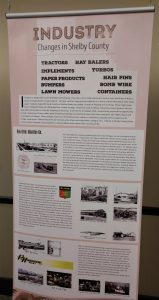Text:
INDUSTRY
Changes in Shelby County
- TRACTORS
- HAY BALERS
- IMPLEMENTS
- TURBOS
- PAPER PRODUCTS
- HAIR PINS
- BUMPERS
- BOMB WIRE
- LAWN MOWERS
- CONTAINERS
Industry has always been a part of Shelby County history. This area is rich in natural resources such as coal, which was at times a source of employment for local residents. Coal was used for many years by residents as a means of both heat and in some cases power. Railways shaped the early industry in Shelby County by creating a means of shipping and receiving. Many major industries in Shelbyville today are still located near railway frontage. Businesses such as Tallman Industries created products for railways while others relied on them for shipping and receiving. In the decline of railways, P&H manufacturing captured the opportunity to make components of semi trailers, while Continental Bondware nearly had to close their doors during the late 1980s closure and consolidation of railways. These examples remind us that Shelby County industry is resilient but certainly not homogeneous to change and progress. Different industries are harmed, while others are helped when change occurs. Industry in Shelby County shows many examples of people coming together to solve problems and improve their rural way of life.
Ann Arbor Machine Co.
Ann Arbor Machine Company, originally based in Ann Arbor, Michigan, has ties to Shelbyville long before it comes to town. In 1915, Horace M. Tallman sells his first invention to the company for $5,000 plus royalties for 7 years. In 1919, the company goes bankrupt and the Tallman family purchases the company through liquidation at Public Auction where they obtain all patents and capital assets. At the time of purchase, the company made hay presses, also known as stationary balers. The Tallmans move to Ann Arbor for a short time to operate their new company. In October 1922, they make a decision to move the entire company to Shelbyville, Illinois and operate it in the Smith Factory, along with the already present railroad and mining business. In 1925, Horace Tallman begins to experiment with the concept of a pickup hay baler. In 1928, Tallman designs engineering for the pickup baler along with his sons and engineer Raymond D. MacDonald. Unfortunately, Horace Tallman dies suddenly, but the others continue testing and improvements on the baler. In July 1930, the first farmer bought and used the Ann Arbor pickup baler and by 1935, they were operating in 19 foreign countries. Horace M. Tallman is credited as the inventor of the first successful pickup hay baler from right here in Shelby County. In 1943, Oliver Corporation purchases Ann Arbor Machine Company and continues to make their balers for several years.
OLIVER “FINEST IN FARM MACHINERY”
In November 1943, Oliver Corporation purchases Ann Arbor Machine Company patent royalties and leases manufacturing plant. In December 1943, a fire devastates the Oliver buildings and machinery, but the community breathes a sigh of relief when Oliver and Tallman’s announce plans to rebuild. They continue making the Ann Arbor designed baler for a number of years. In 1954, Oliver gets government arms contracts and expands by 20% for production. They manufacture Navy missile containers from 1956-1957 before returning to solely manufacturing agricultural products. In 1958, the company announces plans to manufacture several new products, which meant expansion for the Shelbyville plant. In 1960, White Motor Company purchases the Shelbyville Plant. Employees enjoy year-round employment with the addition of the corn picker and corn header production in 1962. White goes on to purchase Cockshutt and Minneapolis Moline adding more growth to the Shelbyville plant. In 1963, Oliver is the largest manufacturing employer in Shelbyville and the city celebrates their 20th anniversary of employment. They employ 700 people in 1963. Unfortunately, White Motor Company closes the plant in October 1970 causing 275 lost jobs and production moves to other plants. Causes cited are the decrease in number of farms producing more with less and larger equipment.
P&H Manufacturing
P&H is a long standing manufacturing company in Shelbyville specializing in agriculture products and assembles parts for transportation and other metal manufacturers. In 1946, Charles Dexter “Deck” Peifer and Earl Arthur Holland business begins by sharpening plows for area farmers. From that expanded to other metal work projects and a need for more space. Over the years, P&H creates many agricultural products relevant to rural America. Items such as Anhydrous Ammonia applicators, TV antennas, parts for lawn mowers, truck bumpers, and more. A major shift in the 1980s from railroad consolidation to trucking goods becomes a business opportunity for P&H. The business begins creating door frames and undercarriage suspension frames and successfully turned their whole business around. Presently, P&H operations are housed in the facility formerly owned and operated by The Oliver Corporation.




